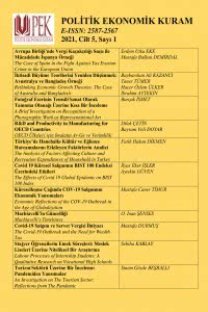Werner Sombart’ın İktisadi Düşüncesinde Kapitalist Zihniyetin ve Girişimcilik Ruhunun Ortaya Çıkışı
20. yüzyılın başında Almanya’nın önde gelen sosyal bilimcilerinden biri olan Werner Sombart (1863-1941), genç tarihçi okulun temsilcilerinden Gustav Von Schmoller (1838-1908)’in etkisiyle akademik hayatının başından beri Alman Tarihçi Okul geleneği ile yakın ilişki içinde olmuştur (Michaelides ve Milios, 2009: 497-8; Hodgson, 2006: 109). Alman Tarihçi Okulunun tarihsel araştırmalara önem veren yaklaşımını benimsemiş ve tarihsel araştırmalara büyük bir ağırlık vermiştir. Sombart tarihsel malzemeyi kullanarak zihniyet, ahlak, kültür ve gelenekler gibi zihinsel kategorilerin modern kapitalizmin işlemesinde oynadığı rolü araştırarak kapitalizmin incelenmesine yeni bir yaklaşım getirmiştir (Rüstow, 1941: 91). Alman Tarihçi Okulunun yaklaşımından farklı olarak ekonomik süreçlerin işleyişinde bu tür ahlaki ve zihinsel unsurların önemli olduğunu ortaya koymuştur (Ülgener, 1941: 99-101). Bu çalışmanın amacı Sombart’ın iktisadi analizinde zihniyetin önemini ele almak ve Sombart’ın kapitalist zihniyetin doğuşuna dair görüşlerini incelemektir. Bu amaç doğrultusunda bu çalışma üç bölümden oluşmaktadır. İlk bölümde Sombart’ın analizinde zihniyetin yeri ve önemi değerlendirilecek, ikinci bölümde Sombart’ın kapitalizm öncesi dönemin zihniyetine ilişkin ortaya koyduğu özellikler incelenecek, çalışma Sombart’ın kapitalist zihniyetin oluşumu ile ilgili görüşlerinin değerlendirilmesi ile son bulacaktır.
Anahtar Kelimeler:
Werner Sombart, Kapitalist Zihniyet, Girişimcilik Ruhu, the capitalist mentality, the entrepreneurial spirit
The Emergence of the Capitalist Mentality in Werner Sombart's Economic Thought: The Entrepreneurial Spirit and the Bourgeois Mentality
Werner Sombart (1863-1941), one of Germany's leading social scientists at the beginning of the 20th century, has been in close contact with the tradition of the German Historical School since the beginning of his academic life, under the influence of Gustav Von Schmoller (1838-1908), one of the representatives of the young historian school (Michaelides and Milios, 2009: 497-8; Hodgson, 2006: 109). He embarked on the approach of the German Historical School by giving importance to historical studies. Using historical material, Sombart brought a new approach to the study of capitalism by investigating the role played by mental categories such as mentality, morality, culture and traditions in the functioning of modern capitalism (Rüstow, 1942: 91). Unlike the German Historical School, he revealed that such moral and mental elements are important in the functioning of economic processes (Ülgener, 1941: 99-101). The aim of this study is to discuss the importance of mentality in Sombart’s economic analysis and to examine Sombart’s views on the emergence of the capitalist mentality. For this purpose, this study consists of three parts. In the first part, the place and importance of mentality in Sombart’s analysis will be evaluated, in the second part, the characteristics of Sombart’s mentality in the pre-capitalist period will be examined, and the study will conclude with the evaluation of Sombart’s views on the formation of the capitalist mentality.
___
- Aslan, V.U. (2020). “Değer Biçimi Çözümlemesi ya da İktisat Yanılsamasının Eleştirisi”, Praksis, 54, 179-202.
- Bernstein, R.J. (2009). Objektivizmin ve Rölativizmin Ötesi: Bilim, Hermenotik ve Praxis (Çev. F. Yılmaz), İstanbul: Paradigma Yayıncılık.
- Bozkurt, N. (2008), “Kant Felsefesine İlişkin Notlar”, içinde Kant, İstanbul: Say Yayınları.
- Chaloupek, G. (1995). “Long-Term economic perspectives compared: Joseph Schumpeter and Werner Sombart”, The European Journal of the History of Economic Thought, 2 (1): 127-49.
- Epstein, M. (1909). “Translator’s Introduction”, (v-ix) içinde Sombart, W. (1909). Socialism and The Social Movement. London and New York: J.M. Dent and Co, E. P. Duttona and Co.
- Hodgson, G. (2006). “Editorial Introduction” içinde “Economic Theory and Economic History (1929) Werner Sombart (1863-1941), Journal of Institutional Economics, 2, 109-11.
- Kant, I. (2008). “Katkısız (Salt Duru) Aklın Eleştirisi” içinde Kant (Çev. N. Bozkurt), Ankara: Lotus Yayınevi.
- Michaelides, P.G. ve Milios, J.G. .(2009), “Joseph Schumpeter and The German Historical School”, Cambridge Journal of Economics, 33, 495-516.
- Yayın Aralığı: Yılda 4 Sayı
- Başlangıç: 2017
- Yayıncı: Ahmet Arif EREN
Sayıdaki Diğer Makaleler
Türkiye’de Turizm Enflasyon İlişkisinin Ampirik Analizi
Reel Politika Faizi ve Negatif Faiz Politikasının Enflasyon ve İstihdama Etkisi
Tarımda yeniden yapılanma ve emeğin dönüşümü: Siirt fıstığı örneği
Simit Ekonomisi: 21. Yüzyıl İktisatçısı Gibi Düşünmenin Yedi Yolu
Adam-Akım İktisadın Öznesi “Homoeconomicus”u Toplumsal Cinsiyet Gözlüğü ile Okumak
Post-Marksizm’in Marksist İktisat Eleştirisi
Covid-19 Aşısına Maliye Teorisinden Bakmak: Erdemli Mallar Bağlamında Bir İnceleme
Şerife ENGELOĞLU, Gülbiye YENİMAHALLELİ YAŞAR, Meliha Meliş GÜNALTAY
